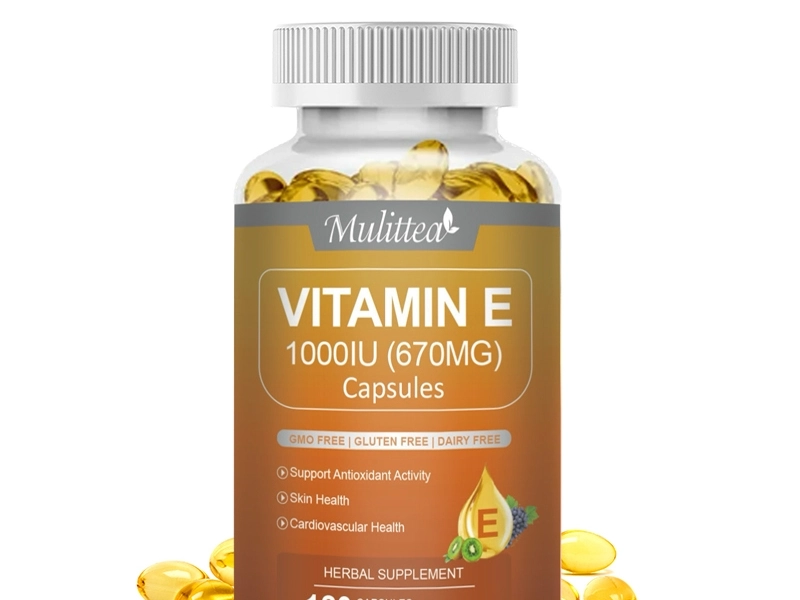Particularly in terms of enhancing skin health and functioning as a potent antioxidant, vitamin E is well known for its several health advantages. Its function in maintaining oral health, particularly for healthy gums, is sometimes disregarded though. This vital vitamin improves general oral hygiene, lowers inflammation, and aids in healing, therefore supporting gum health. We will discuss in this post how vitamin E supports good gums, its sources, and doable daily strategies to include it for best dental health.
 A fat-soluble antioxidant, vitamin E guards against oxidative stress brought on by free radicals in cells. Regarding gum health, vitamin E is absolutely vital in lowering inflammation and encouraging healing. Often stemming from inflammation brought on by plaque accumulation and bacterial infection, gum disease—which can present as gingivitis or periodontitis—often occurs. Including vitamin E into your daily oral hygiene regimen will assist to reduce inflammatory reactions. This vitamin helps gum tissue stay intact, therefore lowering the possibility of gum recession and bleeding. Moreover, vitamin E strengthens the immune system, which is necessary to fight off diseases compromising gum condition.
A fat-soluble antioxidant, vitamin E guards against oxidative stress brought on by free radicals in cells. Regarding gum health, vitamin E is absolutely vital in lowering inflammation and encouraging healing. Often stemming from inflammation brought on by plaque accumulation and bacterial infection, gum disease—which can present as gingivitis or periodontitis—often occurs. Including vitamin E into your daily oral hygiene regimen will assist to reduce inflammatory reactions. This vitamin helps gum tissue stay intact, therefore lowering the possibility of gum recession and bleeding. Moreover, vitamin E strengthens the immune system, which is necessary to fight off diseases compromising gum condition.
 Beyond gum health, vitamin E's antioxidant qualities include general oral hygiene. Antioxidants fight oxidative damage brought on by plaque and bacteria, therefore preventing gum disease and tooth decay. Vitamin E supports a better oral environment by neutralizing damaging free radicals. This vitamin also helps the mouth retain moisture, therefore preventing dryness and discomfort brought on by disorders including xerostomia (dry mouth). Supporting saliva generation depends on a well-hydrated mouth environment, which also helps to neutralize acids and clear food particles. Therefore, making sure you get enough vitamin E can improve your efforts at dental hygiene and help your mouth to be healthier.
Beyond gum health, vitamin E's antioxidant qualities include general oral hygiene. Antioxidants fight oxidative damage brought on by plaque and bacteria, therefore preventing gum disease and tooth decay. Vitamin E supports a better oral environment by neutralizing damaging free radicals. This vitamin also helps the mouth retain moisture, therefore preventing dryness and discomfort brought on by disorders including xerostomia (dry mouth). Supporting saliva generation depends on a well-hydrated mouth environment, which also helps to neutralize acids and clear food particles. Therefore, making sure you get enough vitamin E can improve your efforts at dental hygiene and help your mouth to be healthier.
 Including foods high in vitamin E into your diet will help to maintain gum health. Excellent sources of this important vitamin are foods such avocados, almonds, seeds, and spinach. Particularly almonds are among the best suppliers of vitamin E, hence they are an excellent snack choice. Other sources consist in green leafy vegetables, hazelnuts, and sunflower oil. Including several of these foods in your meals will increase your vitamin E consumption and help to maintain good gum health. If you find it difficult to satisfy your daily needs from diet alone, also take into account including vitamin E pills. Before beginning any supplements, nevertheless, it is advisable to see a medical practitioner.
Including foods high in vitamin E into your diet will help to maintain gum health. Excellent sources of this important vitamin are foods such avocados, almonds, seeds, and spinach. Particularly almonds are among the best suppliers of vitamin E, hence they are an excellent snack choice. Other sources consist in green leafy vegetables, hazelnuts, and sunflower oil. Including several of these foods in your meals will increase your vitamin E consumption and help to maintain good gum health. If you find it difficult to satisfy your daily needs from diet alone, also take into account including vitamin E pills. Before beginning any supplements, nevertheless, it is advisable to see a medical practitioner.
 Apart from food sources, topical vitamin E treatment immediately improves gum condition. Applying vitamin E oil to the gums will assist to reduce inflammation and encourage healing. Those who have gum sensitivity or discomfort may especially find this approach helpful. To use vitamin E oil, just puncture a vitamin E pill and gently dab the afflicted gum areas. This habit supplies necessary nutrients to encourage gum tissue healing and can help lower redness and swelling. Regular application is a great complement to your dental hygiene schedule since it may clearly enhance gum condition.
Apart from food sources, topical vitamin E treatment immediately improves gum condition. Applying vitamin E oil to the gums will assist to reduce inflammation and encourage healing. Those who have gum sensitivity or discomfort may especially find this approach helpful. To use vitamin E oil, just puncture a vitamin E pill and gently dab the afflicted gum areas. This habit supplies necessary nutrients to encourage gum tissue healing and can help lower redness and swelling. Regular application is a great complement to your dental hygiene schedule since it may clearly enhance gum condition.
Although vitamin E helps gum health, it should be included into a thorough dental cleaning schedule. Important steps in avoiding gum disease are brushing twice a day with fluoride toothpaste and frequent flossing. Monitoring oral health and early on resolving any problems depend on regular dental visits as well. These habits will greatly improve your gum condition when taken along with a diet high in vitamin E and other nutrients. To augment your efforts at oral hygiene, think about utilizing mouthwash including vitamin E or other helpful components. Incorporating vitamin E and keeping proper oral hygiene can help you to develop a complete strategy for healthy gums.
The advantages of vitamin E for gum health reach general well-being. Maintaining good gums has been related, according to studies, to lower risk of systemic diseases including diabetes and heart disease. Gum inflammation can aggravate chronic systemic inflammation, which might affect general health. Supporting gum health with vitamin E helps you also support your body's capacity to fight inflammation and preserve equilibrium. This link emphasizes the need of seeing oral health as a basic component of general health and motivates people to give gum care top priority in their whole wellness plan. Understanding how important vitamin E is to maintaining healthy gums, people can act early to improve their dental situation. Including vitamin E into your regimen will help greatly enhance gum health and general well-being whether from food sources, topical treatments, or keeping good oral hygiene practices. Adopting this vital nutrient can not only aid to preserve good gums but also support a better, more natural smile.